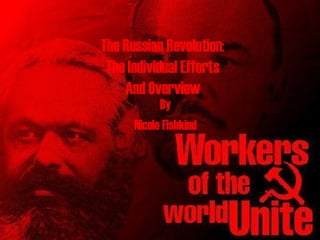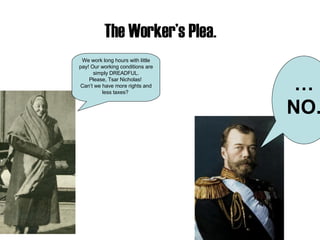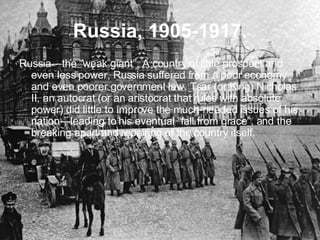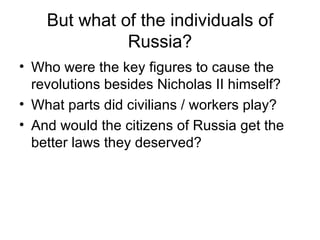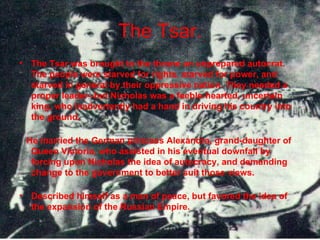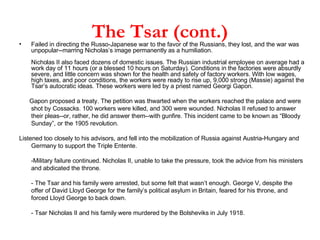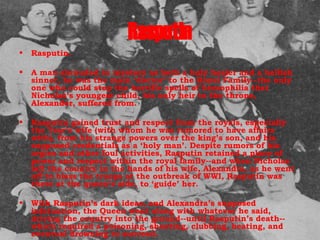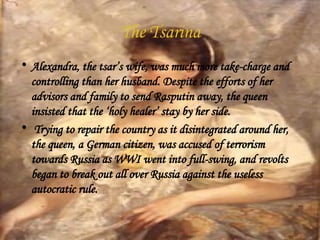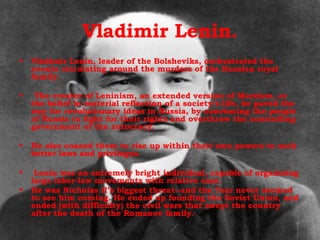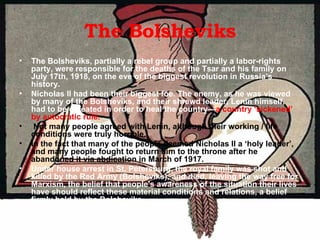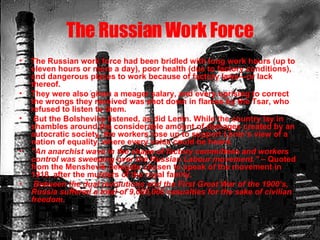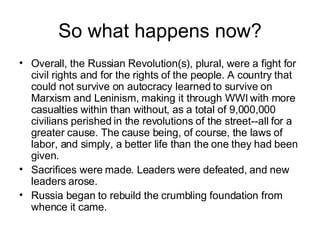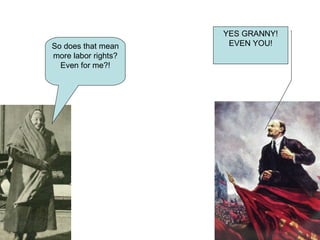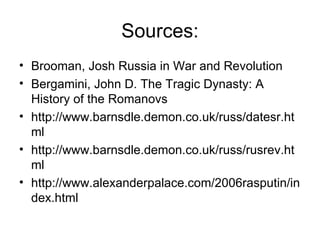Russian Third Draft.
- 1. The Russian Revolution: The Individual Efforts And Overview By Nicole Fishkind
- 2. The Worker¡¯s Plea. We work long hours with little pay! Our working conditions are simply DREADFUL. Please, Tsar Nicholas! Can¡¯t we have more rights and less taxes? ¡ NO.
- 3. Russia, 1905-1917. Russia¡ªthe ¡°weak giant¡±. A country of little prospect and even less power, Russia suffered from a poor economy and even poorer government law. Tsar (or King) Nicholas II, an autocrat (or an aristocrat that rules with absolute power) did little to improve the much-needed issues of his nation¡ªleading to his eventual ¡°fall from grace¡±, and the breaking apart and repairing of the country itself.
- 4. But what of the individuals of Russia? Who were the key figures to cause the revolutions besides Nicholas II himself? What parts did civilians / workers play? And would the citizens of Russia get the better laws they deserved?
- 5. The Tsar. The Tsar was brought to the throne an unprepared autocrat. The people were starved for rights, starved for power, and starved in general by their oppressive nation. They needed a proper leader--but Nicholas was a feeble-hearted, uncertain king, who inadvertently had a hand in driving his country into the ground. He married the German princess Alexandra, grand-daughter of Queen Victoria, who assisted in his eventual downfall by forcing upon Nicholas the idea of autocracy, and demanding change to the government to better suit those views. Described himself as a man of peace, but favored the idea of the expansion of the Russian Empire.
- 6. The Tsar (cont.) Failed in directing the Russo-Japanese war to the favor of the Russians, they lost, and the war was unpopular--marring Nicholas¡¯s image permanently as a humiliation. Nicholas II also faced dozens of domestic issues. The Russian industrial employee on average had a work day of 11 hours (or a blessed 10 hours on Saturday). Conditions in the factories were absurdly severe, and little concern was shown for the health and safety of factory workers. With low wages, high taxes, and poor conditions, the workers were ready to rise up, 9,000 strong (Massie) against the Tsar¡¯s autocratic ideas. These workers were led by a priest named Georgi Gapon. Gapon proposed a treaty. The petition was thwarted when the workers reached the palace and were shot by Cossacks. 100 workers were killed, and 300 were wounded. Nicholas II refused to answer their pleas--or, rather, he did answer them--with gunfire. This incident came to be known as ¡°Bloody Sunday¡±, or the 1905 revolution. Listened too closely to his advisors, and fell into the mobilization of Russia against Austria-Hungary and Germany to support the Triple Entente. -Military failure continued. Nicholas II, unable to take the pressure, took the advice from his ministers and abdicated the throne. - The Tsar and his family were arrested, but some felt that wasn¡¯t enough. George V, despite the offer of David Lloyd George for the family¡¯s political asylum in Britain, feared for his throne, and forced Lloyd George to back down. - Tsar Nicholas II and his family were murdered by the Bolsheviks in July 1918.
- 7. Rasputin Rasputin. A man shrouded in mystery as both a holy healer and a hellish sinner, he was the main ¡®doctor¡¯ to the Royal Family--the only one who could stop the horrific spells of hemophilia that Nicholas¡¯s youngest child, his only heir to the throne, Alexander, suffered from. Rasputin gained trust and respect from the royals, especially the Tsar¡¯s wife (with whom he was rumored to have affairs with), from his strange powers over the king¡¯s son, and his supposed credentials as a ¡®holy man¡¯. Despite rumors of his orgies and other foul activities, Rasputin retained a place of power and respect within the royal family--and when Nicholas left the country in the hands of his wife, Alexandra, as he went off to bless the troops at the outbreak of WWI, Rasputin was there at the queen¡¯s side, to ¡®guide¡¯ her. With Rasputin¡¯s dark ideas, and Alexandra¡¯s supposed infatuation, the Queen went along with whatever he said, driving the country into the ground--until Rasputin¡¯s death--which required a poisoning, shooting, clubbing, beating, and eventual drowning to succeed.
- 8. The Tsarina Alexandra, the tsar¡¯s wife, was much more take-charge and controlling than her husband. Despite the efforts of her advisors and family to send Rasputin away, the queen insisted that the ¡®holy healer¡¯ stay by her side. Trying to repair the country as it disintegrated around her, the queen, a German citizen, was accused of terrorism towards Russia as WWI went into full-swing, and revolts began to break out all over Russia against the useless autocratic rule.
- 9. Vladimir Lenin. Vladimir Lenin, leader of the Bolsheviks, orchestrated the events circulating around the murders of the Russian royal family. The creator of Leninism, an extended version of Marxism, or the belief in material reflection of a society¡¯s life, he paved the way for revolutionary ideas in Russia, by convincing the people of Russia to fight for their rights and overthrow the controlling government of the autocracy. He also coaxed them to rise up within their own powers to seek better laws and privileges. Lenin was an extremely bright individual, capable of organizing large labor-law movements with relative ease. He was Nicholas II¡¯s biggest threat--and the Tsar never seemed to see him coming. He ended up founding the Soviet Union, and ended (with difficulty) the civil wars that swept the country after the death of the Romanov family.
- 10. The Bolsheviks The Bolsheviks, partially a rebel group and partially a labor-rights party, were responsible for the deaths of the Tsar and his family on July 17th, 1918, on the eve of the biggest revolution in Russia¡¯s history. Nicholas II had been their biggest foe. The enemy, as he was viewed by many of the Bolsheviks, and their shrewd leader, Lenin himself, had to be defeated in order to heal the country¡ª a country ¡®sickened¡¯ by autocratic rule. Not many people agreed with Lenin, although their working / life conditions were truly horrible. In the fact that many of the people deemed Nicholas II a ¡®holy leader¡¯, and many people fought to return him to the throne after he abandoned it via abdication in March of 1917. Under house arrest in St. Petersburg, the royal family was shot and killed by the Red Army (Bolsheviks), and died, leaving the way free for Marxism, the belief that people's awareness of the situation their lives have should reflect these material conditions and relations, a belief firmly held by the Bolsheviks.
- 11. The Russian Work Force The Russian work force had been bridled with long work hours (up to eleven hours or more a day), poor health (due to factory conditions), and dangerous places to work because of factory laws¡ªor lack thereof. They were also given a meager salary, and every uprising to correct the wrongs they received was shot down in flames by the Tsar, who refused to listen to them. But the Bolsheviks listened, as did Lenin. While the country lay in shambles around the considerable amount of damages created by an autocratic society, the workers rose up to support Lenin¡¯s view of a nation of equality, where every voice could be heard. "An anarchist wave in the shape of factory committees and workers control was sweeping over the Russian Labour movement.¡± ¨C Quoted from the Menshevik delegate chosen to speak of the movement in 1918, after the murders of the royal family. Between the dual revolutions and the First Great War of the 1900¡¯s, Russia suffered a total of 9,000,000 casualties for the sake of civilian freedom.
- 12. So what happens now? Overall, the Russian Revolution(s), plural, were a fight for civil rights and for the rights of the people. A country that could not survive on autocracy learned to survive on Marxism and Leninism, making it through WWI with more casualties within than without, as a total of 9,000,000 civilians perished in the revolutions of the street--all for a greater cause. The cause being, of course, the laws of labor, and simply, a better life than the one they had been given. Sacrifices were made. Leaders were defeated, and new leaders arose. Russia began to rebuild the crumbling foundation from whence it came.
- 13. So does that mean more labor rights? Even for me?! YES GRANNY! EVEN YOU!
- 14. <Fin> / Fun. http://www.youtube.com/watch?v=9RK9jvK2kGk More facts on Rasputin, set to a jazzy techno song. http://www.youtube.com/watch?v=oUV2QTXIW1U Famous speech of Lenin w/translation on the right.
- 15. Sources: Brooman, Josh Russia in War and Revolution Bergamini, John D. The Tragic Dynasty: A History of the Romanovs http://www.barnsdle.demon.co.uk/russ/datesr.html http://www.barnsdle.demon.co.uk/russ/rusrev.html http://www.alexanderpalace.com/2006rasputin/index.html
